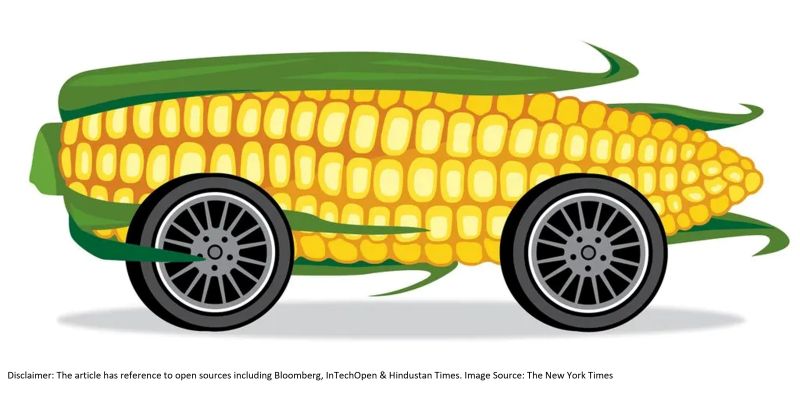“After decades of battling against more ethanol going into cars, Big Oil is joining Big Agriculture in a push to expand use of the corn-based biofuel,” reports Bloomberg.
The rise of electric cars is set to curb both liquid fuels, bringing oil & farm groups closer together. Fossil-fuel giants are ramping up investment in renewable fuels in a bid to capture government incentives aimed at cutting emissions & curbing climate change. With electric cars gaining momentum, questions arise about the future of biofuels. However, Big Oil and Big Agriculture are joining forces to advocate for their continued relevance.
Most of the gasoline sold in the US contains 10% ethanol called E10. Selling higher blends like E15, particularly during summers, requires waiver from Environmental Protection Agency.
The American Petroleum Institute (API) is uniting with the National Corn Growers Association & the Renewable Biofuels Association to support the sale of E15 around the year. The effort faces some resistance from independent refiners more exposed to biofuel compliance costs.
The two industries have had an adversarial past. The US government began to encourage the use of ethanol in late 1970s following the oil crisis. After 9/11 terror attacks intensified energy security concerns, Congress established a mandate compelling ethanol & other biofuels to be mixed into national fuel supply. Oil importing countries like India have been encouraging use of biofuels.
The Biden Administration has set a target for half of all US vehicles to be electric by the end of the decade. Electric cars have not significantly dented the global demand for fuels so far, but Bloomberg estimates the displacement of oil consumption by EVs will increase to >20 million barrels a day by 2030.
Ethanol backers are pushing biofuels as a significant tool to help slash carbon emissions; it will take decades for America’s passenger-car fleet to be entirely electric. Nitin Gadkari, a key minister in the Indian government, has pushed for the adoption of biofuels by the auto industry. This collaboration aims to secure a bright future for biofuels amidst the rise of electric vehicles.
Biofuel offers an alternative energy source to meet the energy demands while minimizing environmental impact. Corn, rich in starch, can be easily converted to ethanol used in biofuel production. One key challenge for biofuels is overcoming concerns about its future potential compared to electric vehicles.
Using maize as a feedstock for biofuel production can boost the agriculture industry, create jobs in farming, processing, & transportation, & reduce oil import bills in countries like India & China.
India’s Union Government has signed off a plan to procure maize at federally fixed minimum support prices while increasing output & productivity by expanding the area under cultivation as part of a strategy to meet India’s biofuel needs. Farmers will be incentivised to grow more maize through ‘farm-to-fuel’ programme. Gradually, ethanol from sugarcane will plateau & grains such as maize will be used. The new measures will help boost farmers’ incomes & achieve 20% blending of petrol with ethanol by 2025-26. Incentivising farmers is also likely to pay rich electoral dividends. While the future of biofuels remains uncertain, this collaboration between Big Oil and Big Agriculture signifies their continued commitment to its long-term viability


